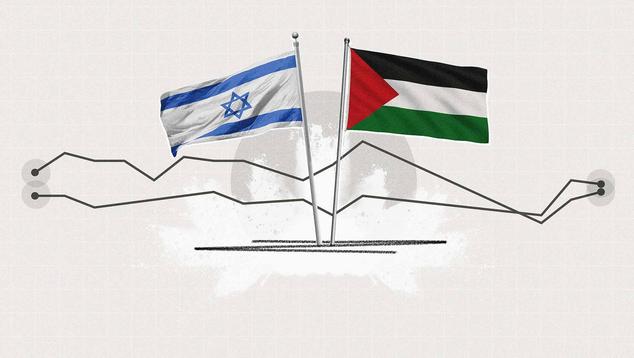This article is the first in a series about life in Israel and in the West Bank and East Jerusalem almost two years after the Israel-Hamas war began.
Note: Gallup’s past surveys in the State of Palestine have included Gaza. Gallup was not able to survey Gaza in 2024 or 2025 because of ongoing security issues. The data in this article represent the views of Palestinians living in the West Bank and East Jerusalem. Jewish Israeli-majority areas within the West Bank and East Jerusalem were not included.
LONDON — Nearly two years after Hamas attacked Israel on Oct. 7, 2023, few Palestinians in the West Bank and East Jerusalem or Israelis believe peace will ever be achieved.
In Gallup surveys conducted in June through August 2025, 21% of adults in Israel said they believe permanent peace between Israel and the State of Palestine would ever be achieved, nearly identical to the 23% of Palestinians in the West Bank and East Jerusalem expressing the same view. In both populations, roughly three times as many (63% in Israel, 65% in the West Bank and East Jerusalem) say permanent peace will never come to pass.
Expectations for peace ever being achieved are up slightly in both locations compared with 2023. In a Gallup survey conducted in the West Bank and East Jerusalem just before the Oct. 7 attack, 15% said they thought peace would ever be achieved. Thirteen percent said the same in Israel in a Gallup poll conducted just after the attack.
The current 23% of Palestinians in the West Bank and East Jerusalem who think peace will be achieved is marginally higher than the long-term average of 19% recorded between 2006 and 2017. By contrast, Israeli optimism has dipped below historical levels, from an average of 28% during that earlier period to 21% today. In both societies, the belief that peace is achievable remains a clear minority position.
Majorities in Israel, West Bank and East Jerusalem Oppose Two-State Solution
Many in the international community, including the United Nations, regard a “two-state solution” — an independent Palestinian state alongside Israel — as the only realistic framework for peace. But public opinion in the region diverges from this vision.
In the West Bank and East Jerusalem, one in three adults (33%) support a two-state solution in 2025, while 55% oppose it. Current support is only modestly higher than in September 2023, when 26% supported the idea and 68% opposed it. Still, support is far below levels recorded in 2012 — the previous time Gallup asked the question — when 66% of Palestinians favored the plan.
Support for a two-state solution is similarly limited in Israel, with 27% of Israelis backing it and 63% opposed. These views have been stable since 2023 but contrast sharply with 2012, when a majority of Israelis (61%) supported the idea.
There are different generational patterns of support for a two-state solution among Israelis and Palestinians. Attitudes are broadly consistent across the two populations among those aged 15 to 29 and 30 to 49. However, there is a significant difference in support among older adults. Just 26% of Israelis aged 50 and older support a two-state solution, compared with 46% of Palestinians the same age.
Bottom Line
These surveys were conducted in June through August, before several nations — including the United Kingdom, France, Australia and Canada — formally recognized the State of Palestine. While this recognition is unlikely to change the facts on the ground in the short term, leaders of these countries are seeking to revive the two-state solution as a way of bringing an end to the conflict.
Despite slight increases since 2023, support for peace and a two-state solution remains limited in both Israel and the West Bank and East Jerusalem. Nearly two years after Oct. 7, 2023, prospects for resolving the conflict remain distant, with pessimism still the prevailing sentiment on the ground.
Stay up to date with the latest insights by following @Gallup on X and on Instagram.
For complete methodology and specific survey dates, please review Gallup's Country Data Set details. Learn more about how the Gallup World Poll works.




